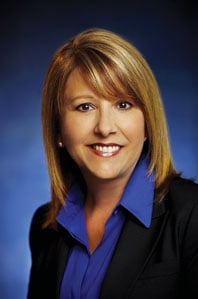CEO on Leadership: Jaclynn Walsh
The president and COO of this Milwaukee-based diversified commercial real estate development company shares her insights on the industry.
JACLYNN WALSH'S real estate career began at what was then one of the Big Eight accounting firms, providing consulting services at the organization’s Los Angeles tax division. After six years in LA, she followed her heart back to Milwaukee, where she blanketed area real estate companies with her resume.

Jaclynn Walsh
One of those resumes landed on the desk of Mark Irgens, who was then president of Boldt Development. At the time, Irgens was expanding the company’s consulting services, and thought Walsh’s experience would add value to the firm. During her more than 15 years there, she focused on representing clients in real estate, including site selections, acquisitions, development entitlements, team selection and management, design and construction administration, and ultimately property management.
In 1998, Mark Irgens, Walsh and two other people purchased the assets of Boldt Development — including contracts and around 45 employees — and formed Irgens, a developer, investor and operator of office, mixed-use, health care and manufacturing properties. Over the years that followed, Walsh applied her skill sets to Irgens’ real estate portfolio. In October 2014, she was named president/chief operating officer of Irgens, which has grown to more than 100 employees at three offices in Milwaukee, Chicago and Phoenix.
Development: How has your role evolved at Irgens?
Walsh: At the time we formed Irgens, my role began to change. As a small company with 45 employees, we realized we no longer had many of the resources of a large company. That is, we had no human resources or information technology departments to handle all of our operational needs. I began to manage those aspects of our business. As my operational role — and the firm — expanded, the time I had to focus on direct project development became limited.
While I enjoy the challenges and successes experienced through managing real estate development projects, my role at Irgens has evolved into making sure we have the right resources in place to identify and administer real estate investments for others and for ourselves.
Development: What are your core areas of focus?
Walsh: My primary focus in operations is risk management. By improving our internal processes, we can better manage the risks facing Irgens and our clients. I believe there is always a better way to do things. We are continually working to improve our processes with the goal of deploying improved solutions. For example, if asked about the reliability of internally presented information, we had better know the answer with a certain degree of accuracy.
Over the past 10 years, we have invested heavily in technology to better manage and share information, both internally and externally. Data integrity is a very simple but important example of how we manage our risk exposures. Having the best resources in place also manages our risk. We have a highly qualified team with varying backgrounds, all contributing to the whole. Through continuing education and the school of hard knocks, we learn through our shared experiences.
Development: What qualities do you look for when hiring senior staff?
Walsh: We target those with an entrepreneurial spirit who are passionate about what they do. We routinely say, “If it were easy, everyone would be doing it.” Those driven by identifying opportunities, addressing challenges head on and who have a desire to succeed will do well. To accomplish such feats, we believe they must be excellent communicators. Further, it is critical that they understand the risks associated with our business, recognize their strengths and weaknesses, and take advantage of the resources around them.
Development: What economic or market indicators do you track on a regular basis to keep up with the industry?
Walsh: Since our primary business is in developing and redeveloping real estate, we must continually monitor the hard and soft costs of development. Critically important are financing costs, and those are not always simply monetary in nature. We must align our project costs with market rental conditions. This can be a delicate balance during challenging economic times. In addition, we closely monitor national and local transaction trends to evaluate and optimize the timing of refinancings and/or sales.
Development: Over the next 18 months, what challenges and opportunities do you see for the commercial real estate development industry?
Walsh: We are optimistic about the next 18 months. The markets appear stable and we have enjoyed high demand for our product for the past several years. We see this continuing over the near term. We’re monitoring the banking industry and the challenges ahead for financing real estate. In addition, we actively participate in the ongoing discussion regarding how taxation changes can influence how we do business.
Development: Looking out three to five years, what do you see on the horizon that will impact the industry? What are you doing today to prepare?
Walsh: Our business model continues to evolve. Structuring transactions to maximize the investments of our stakeholders is paramount to our success. Instead of waiting for the news and reacting, we are actively involved in leading real estate organizations such as NAIOP. This helps us to understand and/or influence relevant issues and to be prepared for the future.
Development: How has the industry changed during your career?
Walsh: Over the years there have been ups and downs, and that can be expected. Living through the Great Recession and seeing and understanding the devastating and profound effect on the real estate industry was most certainly an eye-opener. The entire industry learned from it. Those who survived came out stronger and smarter.
At Irgens, we have become more focused in our service delivery. We do not attempt to be everything to everyone; instead, we aim to be the very best to the valued few.
Development: What is the most valuable lesson you’ve learned over the course of your real estate career?
Walsh: Do not fall behind. Stay ahead and lead. Don’t leave others guessing at where things stand; always be out in front and communicate progress. If you don’t do this, you are simply reacting to others.
Ron Derven, contributing editor, Development







